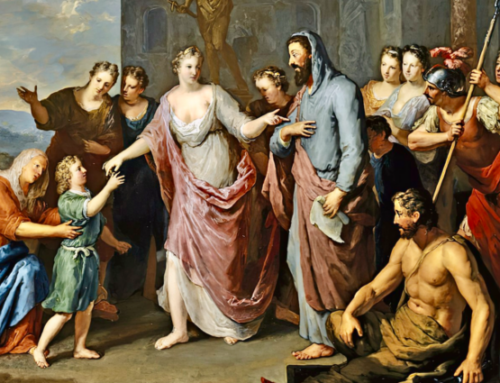The psalms offer themselves as a constant companion through life, anticipating and giving voice to every spiritual concern we may have. They contain a world of thought and feeling, imagery and lyricism. And they supply the profoundest substance to all those of us who need material for our prayer or who don’t always pray as readily as we ought.
 As the Passion approaches, I find myself visiting the Book of Psalms, that ocean of solace and poetry and one of the great gifts of God to humanity. It is a book with as wide a range of expression as you can find in any work of art; whatever mood you are in and whatever the occasion, you can find a psalm for it. Psalm 2 is known as one of the messianic psalms—those which, with theological hindsight, we recognize as foreshadowing the life and deeds of Christ. There are any number of such passages in the pages of the Old Testament, and they can have a profound and powerful effect on you when the prophetic significance “clicks” into focus in the mind.
As the Passion approaches, I find myself visiting the Book of Psalms, that ocean of solace and poetry and one of the great gifts of God to humanity. It is a book with as wide a range of expression as you can find in any work of art; whatever mood you are in and whatever the occasion, you can find a psalm for it. Psalm 2 is known as one of the messianic psalms—those which, with theological hindsight, we recognize as foreshadowing the life and deeds of Christ. There are any number of such passages in the pages of the Old Testament, and they can have a profound and powerful effect on you when the prophetic significance “clicks” into focus in the mind.
Why do the nations conspire
And the peoples plot in vain?
The kings of the earth set themselves,
And the rulers take counsel together,
against the Lord and his anointed, saying,
Let us burst their bonds asunder,
and cast their cords from us.
The psalm brings to mind the forces that conspired against Jesus (God’s “anointed”) in the lead-up to his death: the Pharisees and Judas, Herod and Pilate. The hatred for Jesus and the desire to destroy him were occasioned by the challenge he posed to established human authority and his determination to redirect that authority toward divine standards. The Pharisees, chief priests, and scribes desired to cast off the inconvenient demands Jesus made (“let us burst their bonds asunder, and cast their cords from us”). Read messianically, the psalm makes it clear that those in power were rejecting Jesus and his Heavenly Father together.
We must bear in mind that those who conspired against Jesus were zealous Jews, ever mindful of the Law and desiring to preserve the safety of their people. Their fault was in failing to accept or conceive that God was doing something new in their midst. A failure of vision and imagination, a failure of nerve, a clinging to a false and flimsy security in their relationship with the secular powers. But the psalm then presents an “answer,” portending God’s justice and vengeance on the wicked and his predilection for and salvation of his beloved anointed one.
He who sits in the heavens laughs;
the Lord has them in derision.
Then he will speak to them in his wrath,
and terrify them in his fury, saying,
I have set my king
on Zion, my holy mountain.
I will tell of the decree of the LORD:
He said to me, “You are my son,
today I have begotten you.
Ask of me, and I will make the nations your heritage,
and the ends of the earth your possession.
You shall break them with a rod of iron,
and dash them in pieces like a potter’s vessel.”
The psalm ends with an admonition, guiding future conduct, particularly directed toward the world’s rulers.
“Now therefore, O kings, be wise;
be warned, O rulers of the earth.
Serve the LORD with fear,
with trembling rejoice,
lest he be angry, and you perish in the way;
for his wrath is quickly kindled.
Blessed are all who take refuge in him.
I find the Second Psalm beautifully complemented by the Thirteenth. Although this psalm is perhaps more subliminally messianic, we can hear in it the voice of the suffering Jesus speaking to his Father in his distress.
How long, O Lord? Will you forget me for ever?
How long will you hide your face from me?
How long must I bear pain in my soul,
and have sorrow in my heart all the day?
How long shall my enemy be exalted over me?Consider and answer me, O Lord my God;
lighten my eyes, lest I sleep the sleep of death;
lest my enemy say, “I have prevailed over him”;
lest my foes rejoice because I am shaken.
It is one of what scholars term the psalms of complaint, or psalms of lament. And here again there is a hopeful “answer” to the lament.
But I have trusted in your merciful love;
my heart shall rejoice in your salvation.
I will sing to the Lord,
because he has dealt bountifully with me.
Another great lamenting psalm, with equally rich Passiontide resonance, is No. 31, a psalm which Jesus also quoted from the cross in his last words.
In you, O Lord, I seek refuge;
let me never be put to shame;
in your righteousness deliver me!
[…]
Into your hand I commit my spirit;
you have redeemed me, O Lord, faithful God.
We see this pattern of suffering and relief again and again in the psalms—even from one psalm to another. Consider how the most Passion-saturated psalm of all, No. 22 (“My God, my God, why have you forsaken me?”), is followed by the sublimely gentle and pastoral No. 23 (“The Lord is my shepherd”). A popular theological writer of our day has given a cogent explanation of why Jesus uttered the opening words of Psalm 22 on the cross. It certainly wasn’t an expression of despair—as if Christ really thought or imagined that God had abandoned him. Rather, it was a shorthand way of alluding theologically to the psalm. The opening line of a psalm was a sort of token for the psalm as a whole. Thus, to any Jew that initial line would have brought to mind the entire content of the psalm right down to its hope-filled conclusion:
All the ends of the earth shall remember
and turn to the Lord;
and all the families of the nations
shall worship before him.
For dominion belongs to the Lord,
And he rules over the nations.
[…]
Posterity shall serve him;
men shall tell of the Lord to the coming generation,
and proclaim his deliverance to a people yet unborn,
that he has wrought it.
Jesus was thus signaling from the cross that he was fulfilling everything foreshadowed in the psalm, both suffering and final redemption. As we can hear pre-echoed in all these psalm-laments, Jesus identified with his ancestor David and with all the sufferers among the Jewish people and humanity at large. Anyone who knew how the psalm ended—anyone who had the insight of faith—would have deduced that the seeming tragic despair of the quote was only deceptive. As usual, Jesus’ method of imparting wisdom was subtle, poetic, profound.
The Psalms are of course traditionally ascribed to the great David, who surely merits to be counted the father of all sacred musicians and lyric poets. The very word psallein in Greek means “to play on a stringed instrument,” and we must not forget that the psalms were not merely poems for reading but songs for singing and playing. Little clues as to the psalms’ context, musical performance, and accompanying liturgical action are sprinkled throughout the psalms themselves. One might well consider it a shame that the ancient world had no system of musical notation that we can easily decipher. (In the 1970s, though, a French scholar named Suzanne Haïk-Vantoura presented her reconstruction of biblical chant on an album, The Music of the Bible Revealed, which is still extraordinary to hear. And the composers of our Western tradition have continually lent their gifts toward returning the psalm texts to their musical roots.)
Other biblical historians delve into such questions as how the psalms were originally performed in the Temple worship, how they relate subjectively to David’s own life, how they were assembled into the book we know today—absorbing questions that will probably never be answered definitively. What is certain is that the psalms, for us, offer themselves as a constant companion through life, anticipating and giving voice to every spiritual concern we may have. They contain a world of thought and feeling, imagery and lyricism. And they supply the profoundest substance to all those of us who need material for our prayer or who don’t always pray as readily as we ought. Long may we cherish them—and make use of them.
The Imaginative Conservative applies the principle of appreciation to the discussion of culture and politics—we approach dialogue with magnanimity rather than with mere civility. Will you help us remain a refreshing oasis in the increasingly contentious arena of modern discourse? Please consider donating now.
The featured image is “David Playing the Harp” (1670) by Jan de Bray, and is in the public domain, courtesy of Wikimedia Commons.







Leave A Comment